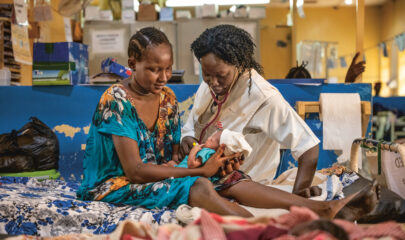TEAMS ASSESS NEEDS AND OFFER MODEST SUPPORT, OTHER ORGANIZATIONS BETTER PLACED FOR DIRECT AID
One week before I was to leave for work as a nurse with Doctors Without Borders/ Médecins Sans Frontières (MSF) in Afghanistan, my field assignment was cancelled due to the declaration of the new coronavirus pandemic. At the same time, MSF was exploring possible pandemic support here in Canada. The operations team was looking for a medical lead, and I was enthusiastic about the possibility of working on an emergency response at home. We soon realized being operational in Canada is very different from planning a typical MSF field response.
In the 30-year history of MSF Canada, we have largely focused on securing financial and human resources to support our medical humanitarian work, providing technical and management expertise to MSF worldwide, as well as engaging the Canadian public in our lifesaving work through advocacy. We do not have a local supply chain, emergency stocks or funding allocated for operations in Canada. Without these tools, we are limited in our ability to respond and to do so independently as we would in the field. As a result, when the pandemic hit, we started looking for partnerships.
With the support of MSF office staff, we began compiling two databases — one of COVID-19 requests from around Canada asking for various levels of support and another of available field workers with MSF experience. Where possible, we facilitated field workers, unable to go on assignments outside of Canada due to travel restrictions, to connect with local organizations that could employ them and benefit from their experience. Through our database of requests, we started getting a picture of the healthcare needs and gaps.
Experienced MSF emergency coordinators in Montreal, Vancouver and Yellowknife made local connections and determined if an MSF operational presence was needed. In Montreal, a team assessed four long-term care facilities. In Toronto, a partnership with a medical association working with people experiencing homelessness was explored.
After a month spent identifying gaps and needs across Canada, all teams came to the same conclusions: Canada’s public healthcare system generally has not been overwhelmed. Despite health inequities that existed prior to the pandemic and still remain, with local COVID-19 efforts often lacking coordination and being highly bureaucratic, we determined other organizations are able and better positioned for medical response in Canada at this time.
We are reminded every day that despite the current pandemic, MSF cannot lose focus on our international programs to assist vulnerable people living with precarious or no access to lifesaving healthcare.
Why did we explore domestic operations given Canada’s advanced medical system? MSF has experienced field workers in Canada who were unable to leave the country and an unprecedented pandemic at hand and so we have endeavoured to make meaningful contributions even if they have been modest.
Over the last few months, we have curated and are disseminating two eBriefings, one on infection, prevention and control (IPC) and COVID-19 consideration and another on adapting and developing medical facilities for COVID-19. We have been in contact with government agencies as well as remote communities, advising and improving upon pandemic plans and providing tailored technical guidance. In Toronto, we continue IPC site visits of shelters, providing recommendations to improve the overall safety of staff and clients.
“COVID-19 is a global health emergency, and responding to emergencies is in our DNA,” said Dr. Christos Christou, MSF International President. This is a sentiment shared by many, even as our team looks back on what we’ve learned so far through our domestic operations and looks ahead to MSF’s future COVID-19 response beyond our borders.


